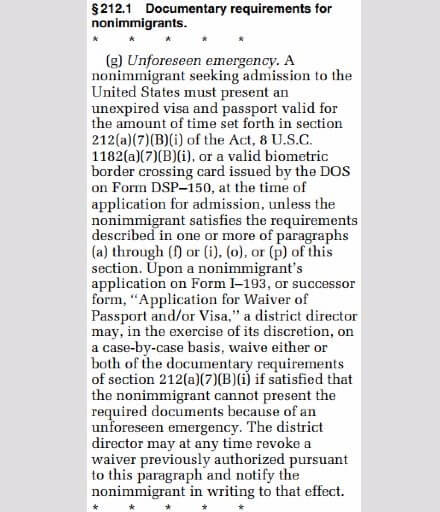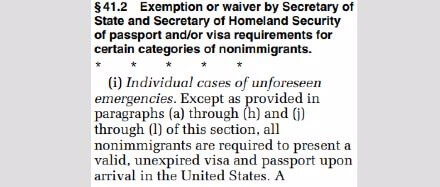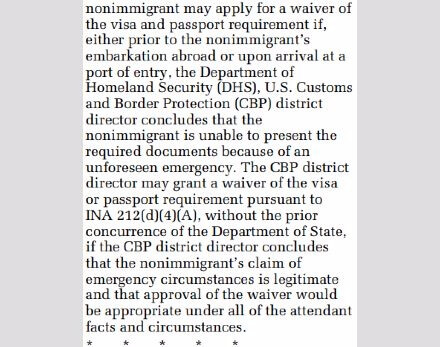- Introduction
- Statutory Background
- DHS Final Rule at 82 FR 41867
- DOS Final Rule at 82 FR 41883
- Joint DOS/DHS Emergency Circumstances Waiver
- Waivers in Immigration Court/BIA
- Conclusion
Introduction
With limited exceptions, an alien must present an unexpired visa and, if applicable, an unexpired passport valid for a certain period of time in order to be admitted into the United States. This applies to those seeking visas or travel documentation through consular processing abroad. On September 5, 2017, both the Department of Homeland Security (DHS) and Department of State (DOS) published final rules in the Federal Register (FR) regarding waivers of the passport and visa requirement in situations in which the alien would otherwise need an unexpired visa and unexpired passport in order to travel to and be admitted into the United States. The amended rules reinstate a 1996 amendment to the implementing regulations that was invalidated by the United States Court of Appeals for the Second Circuit on procedural grounds. The new amended regulations apply to the waiver of the passport and visa requirements in the event of an “unforeseen emergency.” In this article, we will examine the amended rules and the general provisions for a section 212(d)(4) waiver of the passport and visa requirements for admission in section 212(a)(7)(B)(i) of the Immigration and Nationality Act (INA).
Statutory Background
Before examining the new rules, we must first understand the underlying statutes. This is because the new rules amend regulations implementing provisions of the INA.
Under section 212(a)(7)(B)(i)(I) of the INA, an alien is inadmissible if he or she does not have a passport that is valid for a minimum of six months from the date of expiration of either his or her initial period of admission or contemplated initial period of stay. Furthermore, the passport must authorize the alien to return to either the country from which he or she came or to proceed to another country during this period in order for the alien to be admissible.
Under section 212(a)(7)(B)(i)(II), an alien is inadmissible to the United States if he or she is not in possession of either a valid nonimmigrant visa or a border crossing identification card at the time of admission.
Section 212(a)(7)(B) contains three general waiver provisions. Section 212(a)(7)(B)(iii) authorizes a limited waiver for certain visitors to Guam and the Commonwealth of the Northern Mariana Islands. Section 212(a)(7)(B)(iv) references section 217 of the INA, which contains the Visa Waiver Program provisions. However, the new regulations are concerned with section 212(a)(7)(B)(ii), which references exceptions in section 212(d)(4) of the INA.
Section 212(d)(4) of the INA includes discretionary waiver provisions of both sections 212(a)(7)(B) and 212(a). Section 212(a) contains medical grounds of inadmissibility, which we discuss in detail in a separate article on site. The statute specifies that a waiver may be granted jointly by the Secretary of Homeland Security and the Secretary of State (note: statute says “Attorney General” instead of “Secretary of Homeland Security,” but it is the Secretary of Homeland Security under current law). The statute contains three grounds for waivers.
The new rules are concerned with section 212(d)(4)(A) which provides that a waiver may be granted:
on the basis of unforeseen emergency in individual cases.
The other provisions provide for waivers on the basis of reciprocity or for aliens proceeding in immediate and continuous transit. For the purposes of this article, we are only concerned with the unforeseen emergency waiver.
DHS Final Rule at 82 FR 41867
The DHS final rule, published at 82 FR 41867 (Sep. 5, 2017), is titled “Waiver of Passport and Visa Requirements Due to an Unforeseen Emergency” [PDF version].
Background
Section 212(d)(4) of the INA is implemented through regulations found in 8 C.F.R. 212.1. 82 FR 41867 specifically amends 8 C.F.R. 212.1(g), which is the implementing regulation for section 212(d)(4)(A) of the INA.
The DHS explained that the Notice of Proposed Rulemaking associated with the new final rule, published at 81 FR 12032, proposed to reinstate a 1996 amendment to 8 C.F.R. 212.1(g) published at 61 FR 11717. This amendment was invalidated by the United States Court of Appeals for the Second Circuit in United Airlines, Inc. v. Brien, 588 F.3d 158 (2d Cir. 2009) [PDF version]. The pre-1996 rules stated that a visa and passport “are not required” of an alien who demonstrates an unforeseen emergency. In 1996, the then-Immigration and Naturalization Service (INS) amended its regulations to remove the phrase “are not required.” This change was significant in light of section 273 of the INA, which provides for fines against airliners that bring an alien in the United States who does not have a passport and an unexpired visa.
United Airlines, Inc. v. Brien arose when the INS attempted to fine an airliner that brought an alien into the United States who did not have a valid passport or visa, but who was subsequently paroled into the United States as an act of discretion upon arrival. The Second Circuit invalidated the amendment to 8 C.F.R. 212.1(g) because it determined that the amendment was procedurally defective. Specifically, the Second Circuit noted that the INS had amended the regulation without acting jointly with the DOS, as it determined was required under section 212(d)(4) of the INA. It also invalidated the parallel DOS amendment, enacted subsequently in 1999, on the same grounds and because the DOS enacted its version of the amendment without putting it through the public notice and comment process required in most cases under the Administrative Procedures Act (APA).
The Second Circuit decision also invalidated amendments made to 8 C.F.R. 212.1(g) added in 2002 and 2007 on identical grounds. It is worth noting that the Second Circuit did not find that the actions of INS/DHS in fining the airliners for transporting an alien who was subsequently granted an unforeseen circumstances waiver was invalid outside of the procedural defects in the enactment of the regulations.
Accordingly, the DHS and the DOS jointly promulgated the new rules in order to address the procedural defects noted in the Second Circuit decision.
Text of the Amended Rule
The amended version of 8 C.F.R. 212.1(g) reads as follows:

Analysis of Unforeseen Emergency Waiver
8 C.F.R. 212.1(g) allows for the U.S. Customs and Border Protection (CBP) to grant an unforeseen circumstances waiver to an alien seeking admission into the United States. It applies to aliens who are not otherwise exempt from the document requirement for admission under section 212(a)(7)(B)(i) of the INA. Aliens who may benefit are those who lack an unexpired visa and passport valid for the amount of time required by statute or a valid biometric border crossing card issued by the DOS.
An applicant may seek a waiver from the CBP by filing the “Form I-193, Application for Waiver of Passport and/or Visa,” with fee. A CBP district director may exercise his or her discretion on a case-by-case basis to waive either or both of the documentary requirements found in section 212(a)(7)(B)(i). In order to grant the waiver, the district director must be satisfied that the nonimmigrant cannot present one or both documents due to an “unforeseen emergency.” The district director has the discretion to revoke a previously granted unforeseen emergency waiver at any time.
One notable point is that the phrase “unforeseen emergency” is not defined. At 81 FR 41868, the DHS explained, in response to comments, that it had determined that a “discretionary case-by-case approach is preferable to establishing a specific definition of or criteria for establishing an unforeseen emergency…” The DHS’s reasoning was that it would be impossible to list or define all of the possible emergencies that could justify a waiver under 8 C.F.R. 212.1(g). Accordingly, it determined that defining the phrase “unforeseen emergency” in the regulations would be unduly limiting. This does not represent a change in policy.
However, there is still legacy INS guidance regarding the scope of the section 212(d)(4) waiver from the Inspector’s Field Manual (IFM). A legacy memorandum issued by then Executive Associate Commissioner of the Office of Field Operations, John N. Williams, outlined circumstances in which section 212(d)(4) waivers may be granted (HQINS 70/12.2.1 (Sep. 30, 2002) [PDF version].
The memo defined “unforeseen emergency” in 8 C.F.R. 212.1(g) as:
An alien arriving for a medical emergency;
An emergency or rescue worker arriving in response to a community disaster or catastrophe in the United States;
An alien accompanying or following to join a person arriving for a medical emergency;
An alien arriving to visit a spouse, child, parent, or sibling who within the last 5 days has unexpectedly become critically ill or who within the past five days has died; or
An alien whose passport or visa was lost or stolen within 48 hours of departing the last port of embarkation for the United States.
Under legacy IFM guidance, unforeseen emergency waivers can be granted in cases that fall outside of these five points. Furthermore, because the DHS explicitly declined to specifically define “unforeseen emergency” in the regulations, the list of criteria in legacy INS guidance is not necessarily conclusive. Under the IFM, a waiver could be granted in other circumstances after a CBP officer obtained authorization. An unforeseen emergency waiver may also be granted to an individual whose visa was cancelled under section 222(g) of the INA.
In granting a waiver, the immigration officer considering the request must find that the unforeseen emergency prevented the alien from acquiring the requisite documentation prior to arriving to the United States.
To further clarify, Williams cited to two BIA decisions for examines of circumstances that did not merit unforeseen emergency waivers. In Matter of Le Floch, 13 I&N Dec. 251, 255-56 (BIA 1969) [PDF version], overruled on other grounds by Matter of Kazemi, 19 I&N Dec. 49 (BIA 1984) [PDF version], the Board upheld the denial of a 212(d)(4)(A) waiver of a student visa after the U.S. consulate had incorrectly informed a B visa holder that he did not need a student visa. In Matter of V, 8 I&N Dec. 485, 485-87 (BIA 1959) [PDF version], the Board upheld the denial of a waiver on the basis that the alien had ample opportunity in advance of his travel to obtain a visa.
Note on Airliners
The primary purpose of the publication of the amendments to 8 C.F.R. 212.1(g) and 22 C.F.R. 41.2(i) was to reinstate the DHS’s discretion to levy fines against airliners under section 273 of the INA. This authority was upheld under a pre-United Airlines v. Brien decision of the BIA in Matter of Finnair Flight AY103, 23 I&N Dec. 140 (BIA 2001) [PDF version]. This policy in and of itself was not invalidated by the Second Circuit separate of the procedural defects in the rulemaking process. The rule makes clear that granting a waiver does not negate the documentary requirements of section 212(a)(7)(B) of the INA.
The reinstated policy is designed to dissuade airliners from making their own anticipatory determinations that an individual will be found eligible for an unforeseen emergency waiver. At 82 FR 41868, the DHS stated that it believes the rule “will incentivize carriers to make a reasonable, good-faith effort to ensure that every alien has the proper documentation prior to arrival in the United States.
DOS Final Rule at 82 FR 41883
The DOS final rule, published at 82 FR 41883 (Sep. 5, 2017), is titled “Visas: Documentation of Nonimmigrants Under the Immigration and Nationality Act, as Amended” [PDF version].
The DOS enacted its final rule in response to the United Airlines, Inc. v. Brien decision of the Second Circuit. The rule reinstates the DOS’s 1999 rule that was invalidated by the Second Circuit on procedural grounds, for reasons that we discussed in the “Background” section for the DHS rule. The new rule amends 22 C.F.R. 41.2(i).
Text of the Amended Rule


Analysis
The main effect of the new rule is to reinstate the language that allows DHS the discretion to fine airliners for transporting individuals to the United States who lack the requisite documentation to qualify for admission, but who are granted waivers upon arrival.
The DOS rule retains the guidance that permits the CBP district director to grant an unforeseen emergency waiver under section 212(d)(4)(A) without prior consultation with the DOS, provided that the district director concludes that the claim of emergency circumstances is legitimate and that the granting of the waiver would be appropriate.
Joint DOS/DHS Emergency Circumstances Waiver
Under most circumstances, the CBP may grant a 212(d)(4)(A) waiver without consultation with DOS. This is provided for in the DOS regulations at 22 C.F.R. 41.2(i). However, 22 C.F.R. 41.3 provides for situations in which the DHS and DOS may jointly approve an unforeseen emergency waiver. This provision was not amended in the September 5, 2017 rules.
22 C.F.R. 41.3(a) allows for unforeseen emergency waivers for residents of a foreign contiguous territory who are not exempt from the documentation requirements as outlined in 22 C.F.R. 41.1. In order to qualify, the individual must be a member of a visiting group or excursion proceeding to the United States under circumstances that would make it impractical for him or her to procure a passport and visa in a timely manner.
Under 22 C.F.R. 41.3(b), a waiver may be granted for an alien whose passport is not valid for the requisite period in section 212(a)(7)(B)(i)(I) of the INA and who is embarking for the United States at a port or place remote from any place at which his or her passport could be revalidated. Consideration of a waiver under 22 C.F.R. 41.3(b) will always depend on the place of embarkation and the alien’s need to travel to the United States expeditiously.
Under 22 C.F.R. 41.3(c), a waiver may be granted to an alien whose passport is not valid for the requisite period but who cannot have it revalidated because the alien’s government, as a matter of policy, does not revalidate passports more than six months prior to expiration or until the passport expires.
Under 22 C.F.R. 41.3(d), the DOS may grant a waiver for an alien who is “favorably known at the consular office,” who was previously issued an immigrant visa which expired, and who is proceeding directly to the United States under “emergent circumstances” which preclude the timely issuance of a visa. We discussed what may qualify as emergent circumstances in the eyes of DHS in our section analyzing the new DHS rule.
22 C.F.R. 41.3(e) allows for waivers for members of armed forces and coast guards of foreign countries. In order to qualify, the alien must be on active duty in the armed forces or coast guard of a foreign country and be the member of a group of such armed forces or coast guard traveling to the United States. The travel must be on behalf of either the alien’s government or the United Nations. Arrangements for the travel must have been made with the appropriate military authorities of the United States. The travel must be coordinated with the U.S. Government by such U.S. military authorities, and it must have been approved by both the DOS and DHS.
22 C.F.R. 41.3(f) provides for a waiver for “landed immigrants in Canada” applying for a visa at a consular office in Canada. In order to qualify, the port and expected date of arrival in the United States of the landed immigrant in Canada must be known. The landed immigrant in Canada must be proceeding to the United States under emergent circumstances which preclude him or her from timely procuring a passport or Canadian certificate of identity.
Finally, 22 C.F.R. 41.3(g), an alien within a specific consular office district who obtains DOS authorization because of “unusual circumstances” within the district of the consular office may be approved to join with immigration officers abroad in waivers of documentary requirements in specific categories of cases, provided that his or her case falls within one of those categories.
Waivers in Immigration Court/BIA
Under Matter of Kazemi, an Immigration Judge or the BIA may also consider a request for an unforeseen emergency waiver. Please see our full article on the case to learn more [see article].
Parole in Lieu of Waiver
In lieu of granting an unforeseen circumstances waiver and admitting the alien, the CBP may opt to parole an alien into the United States under section 212(d)(5) of the INA. Parole may be granted for “urgent humanitarian reasons” or for “significant public benefit.” Parole is terminated when the purpose of the alien’s parole is completed, if the alien violates the terms of his or her parole, or otherwise in the discretion of the DHS.
Conclusion
In general, unless an alien is within one of the categories generally exempt from the documentation requirements for admissibility, he or she will be required to have a visa and an unexpired passport under the terms of section 212(a)(7)(B) in order to be admitted into the United States. Under certain circumstances, an alien may be granted either a waiver or parole. In general, it is best to immediately consult with an experienced immigration attorney if emergency circumstances arise for an expeditious case-specific consultation.
Resources and Materials:
Kurzban, Ira J. Kurzban’s Immigration Law Sourcebook: A Comprehensive Outline and Reference Tool. 14th ed. Washington D.C.: AILA Publications, 2014. 165, Print. Treatises & Primers.





